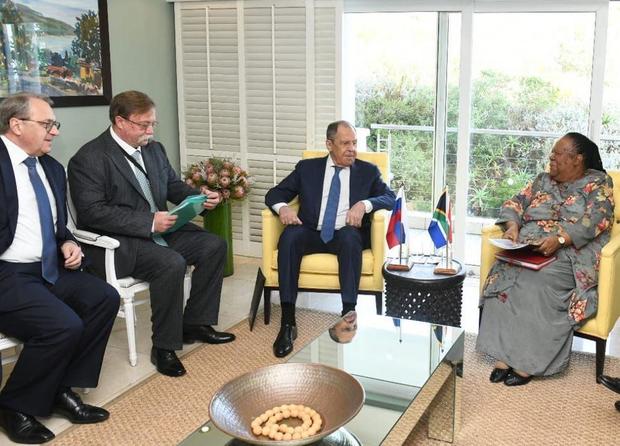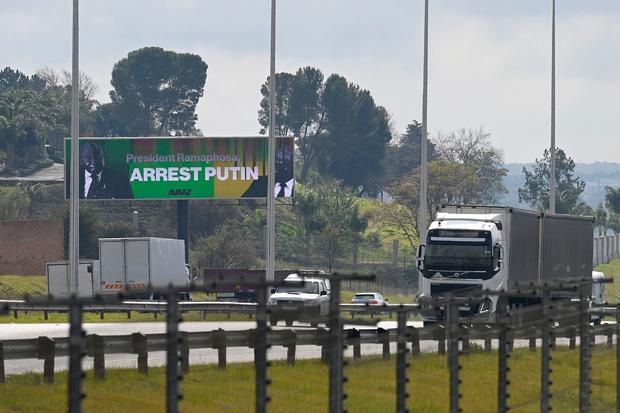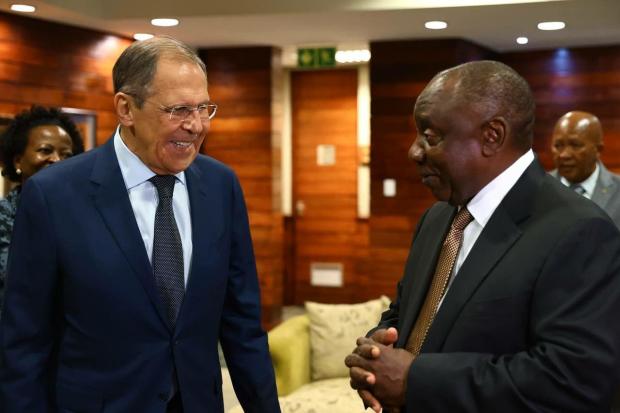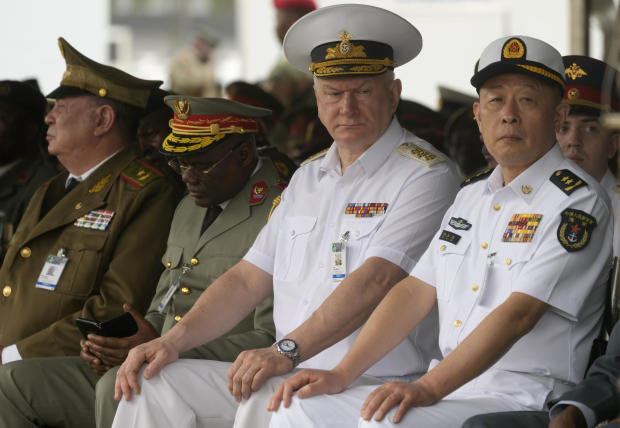Debate over possible Putin visit heats up in South Africa amid U.S.
Johannesburg — The foreign ministers of the five nations of the BRICS bloc of developing economies, Brazil, Russia, China, India and South Africa, were meeting Thursday in Cape Town, South Africa, amid mounting speculation over the prospect of Russian President Vladimir Putin attending an August summit in the country. In March, the International Criminal Court (ICC) issued a warrant for Putin’s arrest over alleged war crimes in Ukraine, so he could potentially face arrest if he sets foot in South Africa, which is an ICC signatory country.
The South African government has said it’s seeking legal advice about possible loopholes in the Rome Statute, which established the international court, that might enable Putin to attend the higher-level BRICS summit this summer.
Handout/Facebook/South African Department of International Relations and Cooperation
On Monday, South Africa’s foreign minister Naledi Pandor announced an order granting diplomatic immunity to all foreign dignitaries attending the meeting this week, as well as the upcoming one in August. It was the clearest signal to date that the South African government is keen to enable Putin to attend the meeting.
Obed Bapela, a senior official in the office of South Africa’s presidency, told the BBC World Service, meanwhile, that the government planned to submit changes to the country’s laws, specifically the ICC Implementation Act, to parliament in June that would give leaders the power to decide who to arrest, regardless of ICC warrants.
Bapela said the government would also seek a specific waiver from the ICC to ensure it would not have to arrest Putin if he did show up in August.
The Democratic Alliance, South Africa’s main opposition party, has launched a court application to force authorities to arrest Putin if he comes this summer.
LUCA SOLA/AFP/Getty
Speaking Wednesday at the National Assembly in Cape Town, President Cyril Ramaphosa said there had been “concerted efforts to draw South Africa into the broader geopolitical contest around the Russia-Ukraine conflict. Yet we have consistently maintain our non-aligned stance, our respect for the U.N. Charter, and for the peaceful resolution of conflict through dialogue.”
As the debate over Putin’s possible visit intensified, Ramaphosa said he would send four of his senior government ministers, including Pandor, to G7 countries as envoys to explain South Africa’s commitment to a “non-aligned” position on Russia’s war in Ukraine.
Earlier in May, Ramaphosa announced an African leaders’ “peace mission” to Ukraine and Russia in June. Presidents Putin and Volodymyr Zelenskyy of Ukraine have said they will meet the African heads of state, who will be led by Ramaphosa.
“Principal to our discussions are efforts to find a peaceful resolution to the devastating conflict in Ukraine,” Ramaphosa said when announcing the mission by himself and six other African heads of state.
Russian Foreign Ministry/Handout/Anadolu Agency/Getty
The BRICS meetings come on the heels of a late-May summit of the Group of Seven (G-7) leaders in Japan. That meeting was marked by the U.S. and the world’s other biggest economies hitting Russia with a raft of new sanctions over its ongoing invasion of Ukraine, and discussion of countering an increasingly assertive China.
South Africa was not invited to the recent G-7 summit — the first time the country had not been invited since Ramaphosa took office in 2018.
U.S. Ambassador to South Africa Reuben Brigety, who on May 11 accused the country of providing Russia with weapons in contradiction to its stated neutrality in Ukraine, noted that officials from BRICS nations had framed the bloc as a “counterpoint” to the G-7, and he made it clear the U.S. was watching.
“Our officials expressed quite serious concern of the explicit articulation of the BRICS configuration as a, quote, counterpoint to the G-7,” Brigety said. “Of course, South Africa is free to choose its diplomatic and economic partners however it chooses and so is the United States of America.”
“This is not a matter of bullying, as I often hear in this context. It’s not a matter of threatening,” Brigety said. “This is how any relationship works.”
Regarding the prospect of Putin visiting South Africa in August and authorities declining to place him under arrest under its obligations as an ICC signatory nation, Brigety said the U.S. could not “understand why the government of South Africa will not publicly and fulsomely commit to the obligations that it has voluntarily taken upon itself.”
South African-U.S. relations have been strained since the country asserted its “non-aligned stance” on the Russian war in Ukraine, and they deteriorated further when Brigety accused South Africa of secretly loading arms onto a sanctioned Russian ship in the Simon’s Town harbor in December 2022, before the ship returned to Russia with its contents.
His remarks came after tension flared in February over South Africa’s decision to host joint naval war games off its coast with Russian and Chinese warships, as the world marked a full year since Russia’s full-scale invasion of Ukraine.
Themba Hadebe/AP
During the Thursday meetings in Cape Town, the five BRICS foreign ministers will be joined virtually by their counterparts from Saudi Arabia, the United Arab Emirates, Iran, Cuba, Egypt, Argentina and the Democratic Republic, to name a few.
This wider group, referred to as “Friends of BRICS,” represent a growing collection of nations from what’s referred to as the Global South who are interested in joining the BRICS bloc.
Russian News agency TASS quoted a source on May 26 as saying Putin had “not withdrawn his participation in the summit,” adding: “The Russian leader has been invited.”
For all the latest World News Click Here
For the latest news and updates, follow us on Google News.





